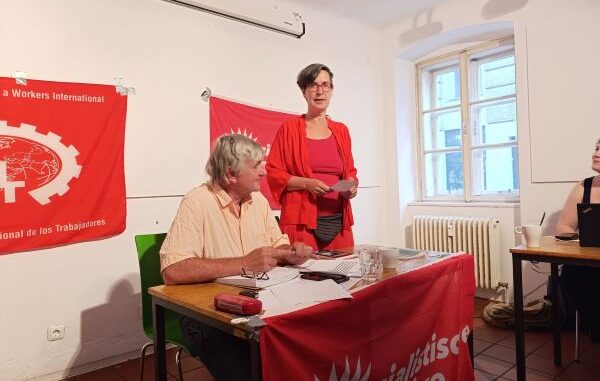
A glance at the news headlines shows: We are living in turbulent times of multiple capitalist crises. Wars in the Middle East and the Ukraine, environmental destruction, right-wing populist governments and, above all, an economic crisis at the core. Austria is one of the European countries having a hard time, particularly as it is now in its third year of economic recession, the longest since Austria’s reestablishment in 1945.
It was against this backdrop that Sozialistische Offensive held its conference in Vienna on June 14 2025. Members from several regions discussed the current economic and political situation together with guests from Germany and abroad. We concluded that the deep crisis of capitalism means a special responsibility for Marxists. “The political crisis is down to the capitalists being incapable of even beginning to solve the numerous crises,” the conference stated. Austria currently is governed by a three-party coalition – including the conservatives, the liberals (NEOS) and the Social Democrats, led by the “left wing” figure Andreas Babler – that is implementing cuts. The rejection of those parties is therefore a rejection of austerity – although currently the anger is mainly picked up by the far right Freedom Party (FPÖ). The fact that right-wing populist forces in particular are currently able to benefit from the discontent is mainly due to the lack of campaigning mass parties of the working class internationally.
Economic and political outlook
The conference dealt with the role of Trump as well as the situation of the global economy, the rising tensions between the imperialist powers in a multipolar world, and the crisis in the Middle East. The resurgence of Die Linke, the Left Party, in Germany after a period of decline which had helped strengthen the far right AfD was also discussed. As a small country of just over 9 million inhabitants international developments have a major impact on Austria. “At the same time, however, we have seen a series of (international) protests and protest movements in recent years, which have often been followed with sympathy and interest in Austria too. This includes uprisings against dictatorships (such as in Belarus or Sudan), against wars (such as Israel-Palestine) or against illiberal regimes such as in Serbia or Turkey. Such movements often begin with democratic demands (such as women’s rights in Iran or anti-corruption in many countries in Eastern Europe or the Balkans), but it quickly becomes clear that social issues are inextricably linked.” We are seeing this development not only internationally, but also in Austria both at the level of international solidarity, through our own concrete experiences and the wider desire to fight back.
We updated our “What we stand for” for the new era, including demands rejecting increasing militarisation. Austria has tried to present itself as “neutral” since the 2nd World War, although since becoming fully independent again in 1955 it has increasingly being part of the western bloc and taking part in UN missions, still using “neutrality” to make business with different parts of the world. While many people support neutrality out of an anti-war sentiment, and we recognise that, we need to make clear that the capitalist system itself means increasing tensions and wars. “The answer to the growing threat of war is neither rearmament nor ‘neutrality’, because war is a necessary consequence of capitalism.”
The discussion on economic and political perspectives in Austria focused, among other things, on the disastrous role of the social democrat SPÖ as a party in government that sells the cuts to the outside world with the blessing of the trade union leaders (they introduced pension cuts by trying to sell them as improvements, for example) and that Andreas Babler has failed across the board. The argument the SPÖ uses is that there is no other way to prevent a Freedom Party led government and that their cuts are “softer” than what the FPÖ would have implemented. This, in turn, is leading to the Freedom Party rising further in the polls. The electoral successes and growth of the Communist Party (KPÖ, they have had several regional and local election successes, while remaining just below the threshold to enter national parliament in general elections) were also part of the discussion. They show that we are by no means dealing with a simple “shift to the right”, but above all with a polarisation that shows the potential for a genuine new party for workers and young people, which is part of struggles and offers a socialist programme.
The other side of the coin is the increase in class struggles in recent years – more aggression from the corporate side, but also more protests and strikes. The trade union leadership is still doing little to counter the government’s policy of cuts and the ongoing job losses and austerity measures in companies as a result of the economic crisis, but it is also coming under increasing pressure from below.
The crisis of capitalism does not take summer breaks and certainly won’t allow for a quiet autumn, Preparing ourselves for this and being part of the protests was the central task of our conference: “We aim to be part of those movements and class struggles that will be central to the development of consciousness and the building of a new workers’ party. This is where we want to put forward our proposals for a programme and strategies for struggle and introduce our small organisation as the most consistent force – for activists, supporters and people who want to join.”
